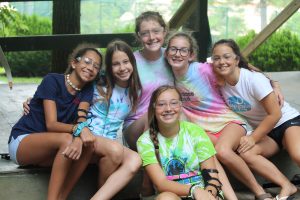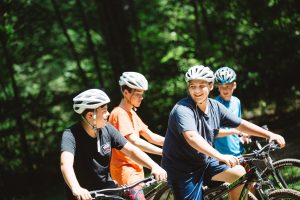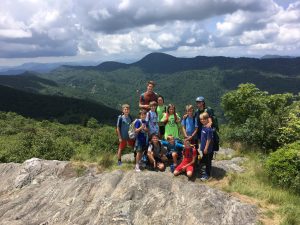 After returning home from Camp Pinnacle, we often hear our campers say, “Everyone is so nice and kind at camp… why can’t it be like that in the real world?” Of course, we’re thrilled to hear this because our culture of kindness is a key part of our program design, and the cornerstone of the community we’ve been building for years.
After returning home from Camp Pinnacle, we often hear our campers say, “Everyone is so nice and kind at camp… why can’t it be like that in the real world?” Of course, we’re thrilled to hear this because our culture of kindness is a key part of our program design, and the cornerstone of the community we’ve been building for years.
Everything we do at Camp Pinnacle intentionally emanates from a place of kindness and respect. But being kind is more than just a good way to live; research shows that kids who are nice actually finish first, in that they become more successful adults.
A 2015 Penn State study by Damon Jones, published in the American Journal of Public Health (July 2015) tracked kindergarteners’ success over 20 years in four major U.S. cities based on the prosocial skills they exhibited in kindergarten. It found that children who demonstrate more “pro-social” skills—those who share more, demonstrate more empathy, and who are better listeners—are more likely to have good jobs and stay out of trouble as young adults.
These pro-social characteristics (empathy, cooperation, perseverance, and self-control) are malleable skills that can be taught. While we naturally attract nice kids at Camp Pinnacle, it’s nice to know that our environment and culture can help already nice kids improve these social skills, continuing to help set them up for success.
Our emphasis on kindness is important because data shows kindness is in decline in the U.S. (though interestingly enough, not in Canada). This matches a long-term decline in empathy, community affiliation, group membership, and use of words like “love,” “gentleness,” “kindness,” and “goodness” in modern discourse. Use of these words have declined 50 percent in the modern age as have conversations about purpose and morality (Journal of Positive Psychology, 2012).
 Some of this decline in kindness may be an unintentional change in our parenting styles as a result of trying to prepare our children for participation in a competitive global economy. From a December 2019 Atlantic article about research from Harvard’s Making Caring Common Project: “If you survey American parents about what they want for their kids, more than 90 percent say one of their top priorities is that their children be caring. This makes sense: Kindness and concern for others are held as moral virtues in nearly every society and religion. But when you ask children what their parents want for them, 81 percent say their parents value achievement and happiness over caring…
Some of this decline in kindness may be an unintentional change in our parenting styles as a result of trying to prepare our children for participation in a competitive global economy. From a December 2019 Atlantic article about research from Harvard’s Making Caring Common Project: “If you survey American parents about what they want for their kids, more than 90 percent say one of their top priorities is that their children be caring. This makes sense: Kindness and concern for others are held as moral virtues in nearly every society and religion. But when you ask children what their parents want for them, 81 percent say their parents value achievement and happiness over caring…
“Kids, with their sensitive antennae, pick up on all this. They see their peers being celebrated primarily for the grades they get and the goals they score, not for the generosity they show. They see adults marking their achievements without paying as much attention to their character.”
As parents, we know that if we want kindness to be a key-value, we must give it support. The Road to Character author Dave Brooks talks about two sets of virtues: résumé virtues and eulogy virtues. In life, the skills we need for the job market, the attributes “essential” for our external and financial success, are often at odds with the virtues that we hope others would attribute to us at our funeral.
 These are the elements of our character, our virtues—the relationships we maintain, our kindness, humility, gratitude, sacrifice, concern for others, morality, integrity, responsibility, and resilience.
These are the elements of our character, our virtues—the relationships we maintain, our kindness, humility, gratitude, sacrifice, concern for others, morality, integrity, responsibility, and resilience.
When kids are praised for helping others, they are more likely to continue this behavior. This is the “why” behind our nightly evening circle. Every night, cabin groups come together to make space to praise their peers who performed good deeds, volunteered, were kind and helped others out. When kids are praised, in public by a role model whom they admire, their kind behavior is more likely to “stick.” Being outside all day also helps. Research by University of California, Berkeley’s Greater Good Science Center (May 2018) finds people demonstrate more generosity when they are outdoors in nature. At Camp Pinnacle, kindness is contagious. Our culture builds on itself, and in an outdoor community, the competition changes from who can achieve the most to who can be the nicest kid!
Besides the fulfillment CP campers get from being a contributing part of a close, caring, and kind community, it’s great to know that they are building skills at camp that will help them “finish first!”
